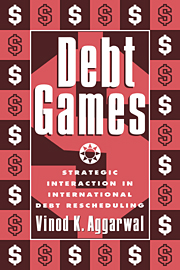Book contents
- Frontmatter
- Contents
- Preface
- Overview
- Part I Argument
- 1 Examining the importance of epochs
- 2 Debt games and play: toward a model of debt rescheduling
- 3 A situational theory of payoffs and intervention decisions
- 4 A theory of situational change
- Part II Epoch I: 1820s–1860s
- Part III Epoch 2: 1860s–1910s
- Part IV Epoch 3: 1910s–1950s
- Part V Epoch 4: 1970s–1990s
- Part VI Implications
- Appendix
- Bibliography
- Index
3 - A situational theory of payoffs and intervention decisions
Published online by Cambridge University Press: 02 December 2009
- Frontmatter
- Contents
- Preface
- Overview
- Part I Argument
- 1 Examining the importance of epochs
- 2 Debt games and play: toward a model of debt rescheduling
- 3 A situational theory of payoffs and intervention decisions
- 4 A theory of situational change
- Part II Epoch I: 1820s–1860s
- Part III Epoch 2: 1860s–1910s
- Part IV Epoch 3: 1910s–1950s
- Part V Epoch 4: 1970s–1990s
- Part VI Implications
- Appendix
- Bibliography
- Index
Summary
In the last chapter, we saw how game theory can illuminate the bargaining strategies available to debtors and lenders in debt games. Although game theory provides some heuristic insight into strategic interaction in general, we must move beyond this valuable but limited tool to find a way to predict actors' payoffs in debt games. Essentially, we should avoid being misled by the word “theory” in game theory. To complement this tool, we need an empirically based theory drawn from international relations and economics that will help us specify actors' payoffs. Game theory can only help us predict the actual outcomes of international bargaining once payoffs have been derived.
This chapter begins the substantial task of developing a situational theory of payoffs that will enable us to derive actors' payoffs in debt games. To this end, the next section develops a simple utility equation to help assess how a debtor and lenders will calculate the consequences of selecting a policy choice in view of its competing goals. I then provide the crux of my situational theory of payoffs by identifying different variables that reflect international and domestic concerns, and the individual situations created by specific combinations of them, that influence an actor's decision to prioritize one goal over another. In the third section, I use the concept of individual situations to develop some hypotheses about how actors in different individual situations will weight their goals.
- Type
- Chapter
- Information
- Debt GamesStrategic Interaction in International Debt Rescheduling, pp. 61 - 83Publisher: Cambridge University PressPrint publication year: 1996



